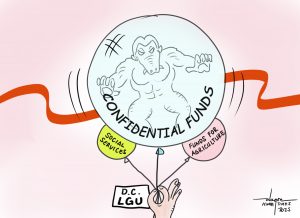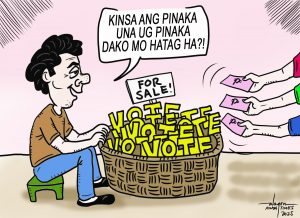We did some travels last week in some parts of Davao City where we saw a lot of infrastructure projects being undertaken. Our purpose was to check whether these projects have been installed the required billboards providing details of each project.
We have noted that in some of these projects there are two billboards. One bears the name of the Department of Public Works and Highways (DPWH), and another bears the logo of the Commission on Audit (COA).
Yet again, we have observed that most of the information that are to be supplied in the billboards were not given. We do not know whether the exclusion of some information was deliberate or not. But what is clear is that in most billboards I have seen only the name of the contractor is provided. In some, the duration of the project is given. Others give the project cost.
We are however, wondering why the COA seems unable to audit its own requirement. It should have done some random inspections in certain project sites. From there it would have known that even the billboards that bear the agency’s logo are not transparent to the public.
May be it is about time that the COA must conduct its own monitoring and check whether the project contractors and the government agency initiating the project fully complied with the requirements.
And perhaps, the Commission on Audit could have seen some of the overpasses that have been completed with two elevators each. The COA would have known that the elevators are actually “white elephant” components of the overpasses.
Yes, these elevators are not being used by those who are supposed to be given easy access to the top of the overpasses like the elderly and persons with disability (PWD).
Imagine each of the elevators costing some P4 million and just being made idle! What are the units for, to meet the “percentage” requirement of some greedy officials?
And if there really is any intention to use the elevators for the purpose that these are included in the overpass projects, when will the government order these operational?
Are the DPWH and the local government still determining who should take care of the electric bills and the personnel costs attendant to its operation?
How we wish some brave and honest souls will come out and tell the public the reasons why it has been allowed to continue “useless” until today?
***********************
We almost missed writing this column yesterday. We were so fixated in watching live over television the hearing conducted by the Senate Committee on Justice and Human Rights on the involvement of certain active police officers in the illegal drugs recycling activity now making the issue on “Ninja cops” notoriously popular.
Based on the testimonies of the primary resource persons it cannot anymore be denied that the proliferation of illegal drugs has become so wide-spread. In effect this disclosure in yesterday’s Senate Committee hearing has negated the impact of the daily reports in the media of busted illegal drugs groups, the increasing number of arrested suspected drug pushers and users, and the ever increasing deaths attributed to the campaign against illegal drugs.
Adding to the misfortune of the Duterte administration’s dead serious campaign against illegal drugs is that yesterday’s Senate Committee hearing highlighted the most unexpected in the President’s 3-year mantra.
That is, that the very people whose monthly pay he has doubled so that they will back him up to the hilt in his drive – the policemen – are also the ones pulling the chances of success of his drive. The Senate committee hearing yesterday brought to the surface the blatant violations by the policemen themselves of the rules in implementing the anti-illegal drugs campaign.
The questions raised by senators Dick Gordon, Franklin Drilon and Panfilo Lacson were so wisely crafted – and supported with evidence –that those who were viewing the live television coverage and those who were part of the audience can easily discern whether the resource persons were telling a lie, hiding something, or protecting the skin of certain persons who were probably also present in the hearing venue.
Then towards the wind-up the main resource persons appeared to be unable to hold their horses. We noted Philippine Drug Enforcement Agency (PDEA) director general Aaron Aquino eventually telling the Senate body upon the prodding of former CIDG chief and now Baguio City mayor Benjamin Magalong that it was PNP Director General Oscar Albayalde who called him insinuating that the latter was trying to influence his action on the erring Pampanga policemen who were supposedly ordered dismissed. They were found guilty of grave misconduct after being found by investigators of not following raid protocol and skimming the volume of drugs and amount of money confiscated from the raided house.
This made PNP Chief Albayalde jumped on his seat and got back at Magalong and Aquino claiming that the then CIDG chief has his time to run after the erring policemen who was at that time under Albayalde who was provincial commander of Pampanga.
But if there was one other thing that yesterday’s hearing succeeded in confirming to the public of its existence, it is the fact that the illegal drugs trade in the country has created a wedge in the police and other law enforcement groups.
Yes, they who are supposed to be united quite strongly are having enmity among each other, all because of the drug money that finds its way to the corrupt policemen’s pockets.


